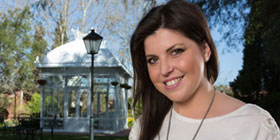Please click here to login into Discovery Digital Id
Fighting Fawn: How she got her life back

Fighting Fawn: How she got her life back
27-year-old Fawn Rogers has a lot to smile about. After a lifetime battling poor health, she has not only reached the path of recovery; she is now skipping down it.
Diagnosed at the early age of 1 with Cystic Fibrosis, a genetic disorder that most commonly affects the lungs, Fawn has only ever known a life of hospitals, doctors, and cautious living. “It affected my life hugely. Daily pills, physiotherapy, and special diets made me stand out at school and I wasn’t able to participate in much which isolated me further. I had to be hospitalised every three months for two weeks of treatment which also meant I missed out on a lot of school and social events.”
A sick childhood
Lung function often starts to decline in early childhood in people who have cystic fibrosis and over time, permanent damage to the lungs can cause repeated, serious lung infections and lead to severe breathing problems. “I was always sick during my childhood but as I got older I became sicker and this lead to more and more medical issues which affected my life hugely. I had been on oxygen at night for about five years prior to being listed on the organ donor list but gradually started needing oxygen during the day, too.”
In 2011, Fawn had just started a part-time job when she fell very ill and was forced to resign. “I spent about six weeks fighting an infection in hospital and by the time I had gotten over the infection, my lung function had dropped drastically and I started to need oxygen 24-hours a day.”
“I could not breathe on my own and even with my oxygen on, breathing was difficult and left me feeling very weak.” With less than 20% lung function left, being listed for a double lung transplant became critical for Fawn. Initially too sick and underweight to be listed immediately, she had a stomach tube inserted which was used to feed her throughout the night. It took nearly a year to gain the weight and strength needed for her to finally be considered for a transplant.
The call that changed her life
12-months later, Fawn received her life-changing call: an organ donor had been found and she was ready for the transplant operation. “I was in hospital at the time and it was all very overwhelming. It’s hard to explain how I felt – there were so many emotions and it all happened so fast. The time between the news and being wheeled into the operating room seemed surreal. I was very emotional and I knew that I had to be mentally strong going in, so I put the emotions aside as much as I could.”
A lengthy 8-hour procedure, Fawn’s medical team removed one lung at a time and replaced each with what she now jokingly refers to as her “shiny new working lungs”. Fawn then spent a week in ICU before being stable enough to be transferred to a normal isolation ward at Milpark Hospital in Johannesburg.
The first 24-hours after her surgery were extremely difficult for Fawn. Pain aside, she faced an additional challenge: what’s called ‘ICU psychosis’, where a patient experiences serious psychiatric symptoms due to the side effects of the drugs being administered. “I thought the nursing staff were trying to kill me. Although we joke about it now, this was one of the worst parts of my transplant. I was so convinced that I started to pull my tubes out and if a nurse hadn’t stopped me in time, it would’ve been fatal for me.”
Her road to recovery
For Fawn, the support of friends and family played a crucial role in her recovery. That, and not having to worry about the financial implications of her surgery. “While I was in hospital recovering for three months, I did not see a single bill. Everything was taken care of by Discovery and I am truly thankful that I had chosen them as my medical aid. I am not sure how much the whole procedure cost but I estimate in the millions – not having to worry about this took a huge weight off my family and my shoulders.”
“My double lung transplant has changed my life. Breathing, such a small involuntary action that most people take for granted, is something I’m hugely grateful for.” Today, Fawn has her independence back. “I can dress myself, drive, cook, socialise. I can even brush my own hair which, until after the transplant, I wasn’t able to do myself – just doing every little day to day activity is so liberating. ”
“When I look back at what I went through I honestly don’t know how I did it. I think this whole journey taught me that in a crisis, although it doesn’t feel like it, we all possess a great deal of strength. You don’t know how strong you are until being strong is the only option.”
What the future holds for Fawn
Hopeful and excited about her future, Fawn is still aware of the magnitude of having been through the transplant process and the responsibility she has to look after her health. “I still have to go for regular checkups which are every three months. I take daily pills which consist of my Cystic Fibrosis pills as well as anti-rejection and transplant medication. I am also a diabetic and need insulin to control this. I know that a transplant is not a cure, but I got my second chance at life, and I’m taking it!”
For more information about Fawn’s journey, follow her blog www.deerdelights.com and to find out about registering as an organ donor, visit the Organ Donor Foundation website www.odf.org.za.